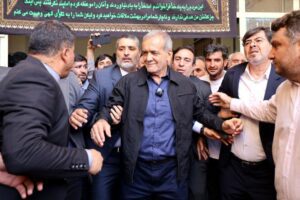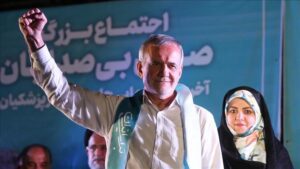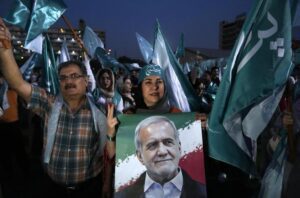In a notable political shift, Iran has elected Masoud Pezeshkian as its new president. The heart surgeon and former health minister emerged victorious in a runoff election against hard-liner Saeed Jalili. Pezeshkian’s election follows the untimely death of President Ebrahim Raisi in a tragic helicopter crash, marking a period of significant change for Iran. But Who is Masoud Pezeshkian, the New Iranian President?
A Brief Biography

Masoud Pezeshkian, a seasoned politician and medical professional, was born to Iranian parents of Azeri and Kurdish descent. His diverse ethnic background and proficiency in multiple languages have made him a unique figure in Iranian politics. Before entering politics, Pezeshkian built a reputable career in medicine, specializing in heart surgery. He transitioned to politics as a reformist, eventually serving as Iran’s health minister, where he gained a reputation for advocating health reforms and improved public services.
Electoral Victory and Significance

Pezeshkian’s election as the 9th president of Iran concluded on July 5, 2024, with a 53.6 percent share of the votes. He secured 16,384,403 votes out of the 30,530,157 cast, marking a 49.8 percent turnout. This makes him the second president with the lowest percentage of votes, following Hassan Rouhani’s 50.7 percent in 2013. His victory highlights a shift in Iranian politics, particularly with strong support from ethnic and religious minorities.
Reformist Champion
Representing Iran’s Reform Front, a political movement that rose to prominence with Mohammad Khatami’s presidency in 1997, Pezeshkian also enjoys backing from the Moderate faction led by former president Rouhani. His election signifies a resurgence of reformist influence, though their dominance had waned over the past two decades. Pezeshkian’s appeal to Iran’s ethnic minorities, particularly the Azeris and Kurds, played a crucial role in his electoral success.
Promises of Reform

Pezeshkian has been a vocal advocate for personal freedoms and criticized Iran’s mandatory hijab law, promising to disband the morality police. His campaign focused on enhancing individual liberties and improving relations with Western countries, especially the United States, in hopes of lifting crippling economic sanctions.
Foreign Policy Implications
Pezeshkian’s presidency arrives at a time when Iran’s foreign relations are under intense scrutiny. His willingness to engage with Western nations marks a potential shift in Iran’s foreign policy, which has been heavily influenced by conservative elements within the government.
Relations with the West
During his campaign, Pezeshkian expressed a desire to review Iran’s relations with Russia and restore ties with the United States. He criticized his conservative rivals for hindering efforts to resolve the nuclear standoff with the West. However, Supreme Leader Ayatollah Ali Khamenei has cautioned against over-reliance on the West, emphasizing that Iran must not depend on any singular global power.
Strategic Partnerships
Iran’s strategic partnerships, particularly with China and Russia, have been crucial, especially since the invasion of Ukraine and the subsequent geopolitical shifts. Pezeshkian’s potential pivot towards the West could alter these dynamics. However, experts like Talal Mohammad, a scholar of Middle Eastern studies, believe significant changes are unlikely in the immediate future due to the entrenched power structures in Iran and the potential return of Donald Trump’s stringent policies against Tehran.
Balancing Domestic and International Expectations
Tehran-based Political Science lecturer Keyhan Barzegar highlights that while the Supreme National Security Council (SNSC) and Khamenei determine Iran’s overall foreign policy direction, the president can influence negotiation methods and engagement strategies. Barzegar suggests that Pezeshkian could advocate for regional stability to enhance Iran’s strategic importance, which may lead to eased sanctions and increased foreign investment.
The Road Ahead
Pezeshkian’s presidency marks a significant moment in Iran’s political landscape. While his promises of reform and improved international relations offer hope, the true test lies in navigating the complex power structures of the Islamic Republic. His ability to balance reformist ambitions with the expectations of the conservative establishment will be crucial.
In his post-election message, Khamenei advised Pezeshkian to trust in God and follow the path set by Martyr Raisi. Despite having former foreign minister Javad Zarif as an advisor, Pezeshkian is likely to adhere to state-outlined foreign policy rather than pursuing a more independent, conciliatory approach.
Masoud Pezeshkian’s election as Iran’s president brings a blend of hope and skepticism. His reformist promises resonate with many Iranians, but his success will depend on his ability to work within the rigid power structures of the Islamic Republic. The international community will be watching closely to see if Pezeshkian can navigate these challenges and bring about meaningful change in Iran’s domestic and foreign policies.
Related stories:
Iran Approves Six Presidential Candidates After Raisi’s Death
Young Iranians’ Divergent Views on 2022 Protests Shape Presidential Race
Thousands Mourn President Raisi After Tragic Helicopter Crash Amid Iran’s Political Crisis
Who is Mohammad Mokhber, Iran’s Interim President?
Iranian President Ebrahim Raisi Dies in Helicopter Crash at 63

















